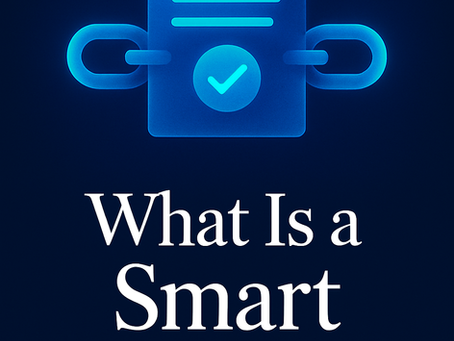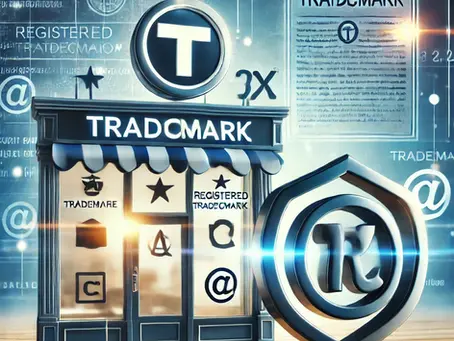top of page
All Posts


What Is a Consensus Mechanism?
A consensus mechanism is the foundational protocol that allows a blockchain network to agree on a shared version of the truth—without a central authority. This article explains how consensus works, compares major models like Proof of Work and Proof of Stake, and explores why these systems matter for security, scalability, and decentralization.

Cristian Rodriguez
Jun 3, 20254 min read


What Is a Decentralized Application (dApp)?
Decentralized applications (dApps) are a key innovation in blockchain, allowing users to interact with smart contracts and peer-to-peer protocols without relying on centralized servers. This article explores how dApps work, what makes them unique, and why they matter across finance, NFTs, gaming, and governance.

Cristian Rodriguez
May 29, 20254 min read


What Is a Smart Contract?
Smart contracts are transforming the way agreements are created and enforced—without intermediaries. This article explains how smart contracts work, how they’re used in industries like finance and IP, and why they’re becoming essential in today’s digital economy.

Cristian Rodriguez
May 22, 20254 min read


Are You a Micro Entity? How to Save on Patent Filing Fees in 2025
Wondering if you qualify for reduced patent fees? In 2025, micro entity status can save you up to 75% on USPTO filing costs. Learn the requirements, how to apply, and what to watch out for—plus how much you could actually save. Rotek Law breaks it down.

Cristian Rodriguez
May 20, 20253 min read


What Is Blockchain?
What is blockchain, and why does it matter?
This article breaks down how blockchain technology works—from its role as a decentralized digital ledger to the deeper mechanics of blocks, hashes, consensus algorithms, and smart contracts. Whether you're new to blockchain or looking to understand its architecture in more detail, this guide walks you through both the foundational concepts and advanced applications across industries.

Cristian Rodriguez
May 16, 20254 min read


How Long Does It Take to Get a Patent in 2025? | Rotek Law
The USPTO backlog hit 830,000+ in March 2025, making delays the new normal. Learn how long it takes to get a patent today—and how to speed up the process with expert guidance and smarter filing strategies from Rotek Law.

Cristian Rodriguez
May 13, 20253 min read


The State of Patents in 2025: Key Insights from USPTO’s March Report
The United States Patent and Trademark Office (USPTO) has released its latest data as of March 2025, revealing significant trends in...

Cristian Rodriguez
May 5, 20252 min read


Trademark Class 41: Education, Training, and Entertainment Services
Thinking of trademarking your educational or entertainment brand? Start here. Updated April 2025 What Is Trademark Class 41? If your...

Cristian Rodriguez
Apr 4, 20253 min read


Trademark Class 9: Electronics, Software, and Scientific Devices
Understanding Class 9 Goods for Trademark Protection Updated April 2025 What Is Trademark Class 9? Trademark Class 9 covers a wide range...

Cristian Rodriguez
Apr 4, 20253 min read


Is It Worth It to File a Patent? A Practical Guide for Inventors
Filing a patent is a big decision. It can be a powerful tool to protect your invention, but it also comes with costs, responsibilities,...

Cristian Rodriguez
Mar 12, 20252 min read


How to Create a Patent: A Step-by-Step Guide
Inventing something new is exciting, but protecting your idea with a patent is what ensures that others can’t copy or profit from your...

Cristian Rodriguez
Mar 12, 20252 min read


The Easiest Way to Get a Patent: What You Need to Know
Getting a patent can feel like an overwhelming process, but if you approach it strategically, you can simplify the journey. Whether...

Cristian Rodriguez
Mar 11, 20252 min read


What Is a Copyright and Why Does It Matter for Your Business?
In today’s digital world, creative content is more valuable than ever. Whether you’re a business owner, artist, writer, or software...

Cristian Rodriguez
Mar 10, 20252 min read


What is a Trademark and Why Does It Matter?
In today's competitive market, branding is everything. Whether you're launching a new product, starting a business, or building an online...

Cristian Rodriguez
Mar 10, 20252 min read


What Is a Patent?
A patent is a legal right granted by the U.S. Patent and Trademark Office (USPTO) that gives an inventor the exclusive ability to make,...

Cristian Rodriguez
Mar 8, 20252 min read
bottom of page
